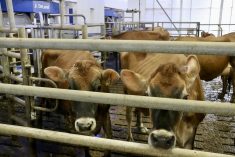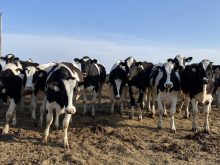Brussels/Paris – Reuters — The European Union will grant an additional 500 million euros (C$721 million) to EU farmers struggling with a long-running crisis linked to low prices, notably in the dairy sector where it aims to reverse a boom in milk output after the scrapping of production quotas.
European milk farmers have been struggling with a slump in prices fuelled by the ending of EU quotas last year, a Russian import ban on Western food products and weak Chinese dairy import.
The Commission’s package includes 150 million euros of subsidies to reduce milk output and 350 million that would come on top of aid granted by member states, thus potentially doubling the support being provided to farmers, it said.
Read Also

Mexico agriculture secretary says still no date for restarting cattle exports to U.S.
Mexican Agriculture Minister Julio Berdegue said on Wednesday that Mexico and the United States have not yet set a date to resume Mexican cattle exports amid an outbreak of the flesh-eating screwworm parasite.
EU weighted raw milk prices have continued to fall since the start of the year and are now down 14.2 per cent on June last year, Commission data showed.
German Agriculture Minister Christian Schmidt welcomed the measure as he arrived at the EU Agriculture Council where the commission officially presented its plan.
“Today is a good day for European and German agriculture,” Schmidt told reporters when he arrived at the Council, noting that the package dealt with both the issue of volume discipline and the outlook for the milk market.
Germany will be the biggest beneficiary of the 350 million euros of conditional aid aimed at securing market stability by reducing output, with 58 million euros, the Commission said.
“Better late than never,” French Agriculture Minister Stephane Le Foll told reporters. “If we had done this before we would certainly have had less problems.”
The crises in the livestock and milk sectors had prompted a wave of protests in France, both last year and again this year.











